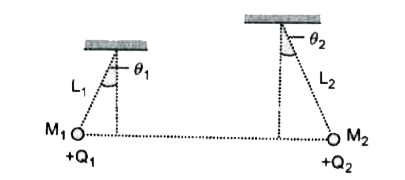In hydrogen atom , electron excites from ground state of higher energy state and its orbital velocity is reduced to (13)rd of its initial value . The radius of the orbit in the ground state is R . The radius of the orbit in that higher energy state is ... Solution in Kannada
R 9
2 R
3 R
27 R
The correct Answer is:C
According to Bohr.s orbit
mvr=nh2π
i.,ev∝1r,v1v2=r2v1
∴vv/z=r2R⇒r2=3R.
Topper's Solved these Questions
- BOOK - MODERN PUBLICATIONCHAPTER - ELECTRONS & PHOTONSEXERCISE - MULTIPLE CHOICE QUESTIONS (LEVEL-III)9videos
ELECTRONS & PHOTONS
- BOOK - MODERN PUBLICATIONCHAPTER - ELECTROMAGNETIC WAVESEXERCISE - RECENT COMPETITIVE QUESTIONS4videos
ELECTROMAGNETIC WAVES
- BOOK - MODERN PUBLICATIONCHAPTER - ELECTROSTATICSEXERCISE - RECENT COMPETITIVE QUESTIONS39videos
ELECTROSTATICS
Similar Questions
Energy required for the electron excitation in Li++ from the first to the third Bohr orbit is :
01:50View SolutionThe speed of electromagnetic wave in vacuum depends upon the source of radiation
01:51View SolutionTwo small spheres of masses M1andM2 are suspended by weightless insulating threads of lengths L1andL2 The spheres carry charges Q1andq2 respectively . The spheres are suspended such that they are in level with one another and the threads are inclined to the vertical at angles of θ1andθ2 as shown . Which one o fthe following conditions , if θ1=θ2 ?
 02:24View Solution
02:24View SolutionThe electron in a hydrogen atom jumps from ground state to the higher energy state where its velcoity is reduced to one-third its initial value. If the radius of the orbit in the ground state is r the radius of new orbit will be
05:16View SolutionThe radius of the Bohr orbit in the ground state of hydrogen atom is 0.5 Å . The radius o fthe orbit of the electron in the third excited state of He^(+) will be
01:52View SolutionIf an orbital electron of the hydrogen atom jumps from the groud state to a higher energy state, its orbital value. If the radius of the electron orbit in the ground state is r , then the radius of the new orbit would be:
02:31View SolutionThe orbital electron of the hydrogen atom jumps from the ground state to a higher energy state and its orbital velocity is reduced to one third of its initial value. If the radius of the orbit in the ground state is r, then what is the radius of the new orbit ?
03:15View SolutionThe orbital velocity of the electron in the ground state of hydrogen atom is v. What will be its orbital velocity when excited to the energy state= −0.544eV?
03:16View SolutionAn orbital electron in the ground state of hydrogen has magnetic moment μ1 .This orbital electron is excited to 3rd excited state by some energy transfer to the hydrogen atom. The new magnetic moment of the electron is μ2
02:34View SolutionIf the radius of electron orbit in the excited state of hydrogen atom is 476.1 pm, the energy of electron in that excited state in J is Radius and energy of electron in the first orbit of hydrogen atom are 52.9 pm and −218×10−18J respectively)
02:05View SolutionIn hydrogen atom , electron excites from ground state of higher energy state and its orbital velocity is reduced to (13)rd of its initial value . The radius of the orbit in the ground state is R . The radius of the orbit in that higher energy state is ...
View SolutionCalculate the energy required to excite an electron from ground state to 3rd excited state if the energy of electron in nth orbit is −13.6/n2
02:36View SolutionThe radius of the Bohr orbit in the ground state of hydrogen atom is 0.5 Å. The radius of the orbit of the electron in the third excited state of He will be
View SolutionThe value of ground state energy of hydrogen atom is - 13.6 eV.
(a) Find the energy required to move an electron from the ground state to the first excited state of the atom.
(b) Determine (i) the kinetic energy, and (ii) the orbital radius in the first excited state of the atom.
(Given the value of Bohr radius =0.53Å)02:34View SolutionThe radius of the Bohr orbit in the ground state of hydrogen atom is 0.5 the radius of the orbit of the electron in the third excited state of He^(+) will be
02:25View Solution

